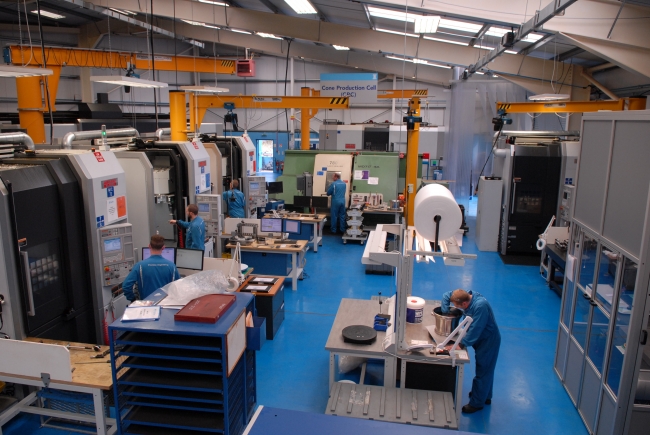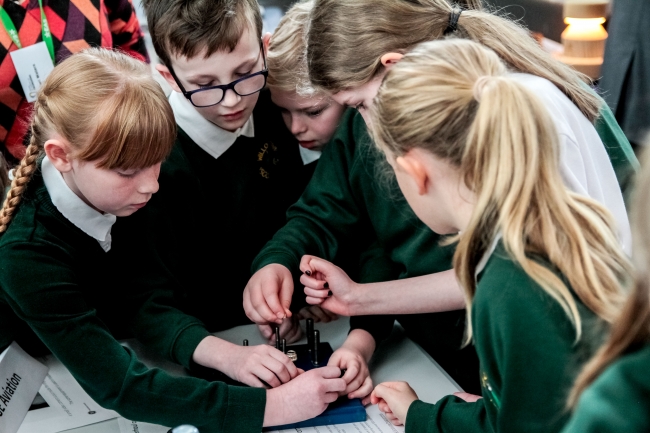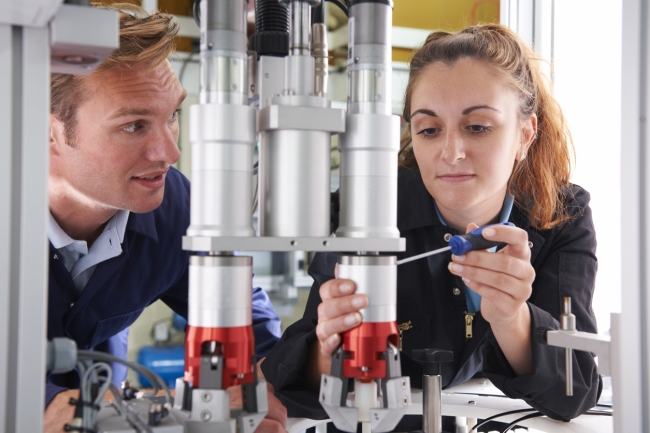In recent years, the UK’s economic performance has outshone that of other countries, with steady growth in jobs and new businesses. However, one area where the UK is lagging behind other major economies is in its productivity, a key metric of future prosperity. Given the UK’s otherwise strong economic outlook, it is a source of concern and frustration, but there is more to this than meets the eye. Measuring productivity is at best an inexact science and becomes more difficult as the economy becomes more complex, so why is it deemed so important?
Read more
The Friday Roundup – 09/11/2018

Every Friday, we round up our top 5 most popular reads from the week, along with sharing some of our favourite finds from around the web.
This week’s roundup includes a record order win for family-firm Castle Precision, electric vehicles inspire the engineers of the future, plus measuring productivity is at best an inexact science, so why is it deemed so important..?
Our top 5 most read this week
1. Competitiveness programme nets over £3bn for UK aerospace
Sharing in Growth has announced that productivity gains made through its aerospace competitiveness programme have resulted in more than £3 billion in contracts, including an £80 million six-year deal between Rolls-Royce Civil Aerospace and Glasgow-based Castle Precision Engineering. Thanking Sharing in Growth for their support of Castle and some 60 other aerospace suppliers, Rolls-Royce Chief Executive, Warren East said: “There is a national need for competitive and match-fit suppliers who are able to win work from companies like Rolls-Royce. What Castle has done is what we all do every day: look at our costs and how we can reduce them, look at how we increase the quality of what we do, and look at how – through clear leadership, technical and business process innovation – we can make our business more competitive and win more orders. Some of this we do ourselves, some of this we do with partners, including Government, and the Government’s funding of Sharing in Growth has made a significant difference to our supply chain, as well as to others in the aerospace sector.” Sharing in Growth CEO, Andy Page, concluded: “Not only has Sharing in Growth been pivotal in supporting programme participants to secure £3.2 billion in contracts, over a year ahead of schedule, but we are well on target to safeguard 10,000 UK jobs by 2022, securing well over £60 of contracts for every £1 of Government investment.”
Read more
2. Electric vehicles inspire the engineers of the future
Electric vehicles took centre stage at the Greenpower International Finals, held recently at Rockingham Speedway. The event is run by the Greenpower Education Trust – a UK based charity that aims to get young people interested in science and engineering by challenging them to design, build and race an electric car – and is a culmination of six months of regional qualifying. The races are contested by teams from private companies, racing clubs, schools, technical colleges and universities, all hailing from a number of countries including the UK, China, Portugal, Poland and Ireland. The finals brought together 122 teams competing in two age categories: IET Formula 24 (ages 11-16) and IET Formula 24+ (ages 16-25). Earlier this year, Ford announced that having been a regional sponsor of the Greenpower Education Trust for 17 years, it would now become a national-level sponsor. In total, 21 Ford engineers attended the event, offering support to the participating teams and answering questions on the roles of engineers. Paul van Veggel, CEO, Greenpower Education Trust, said: “Greenpower is all about developing young people and inspiring them to take up STEM subjects in education, potentially leading to a technical career in the future. Ford partnering with us not only supports that path, but acts as a fantastic example of the sort of forward-looking careers that are open to these young people.”
Read more
3. Castle Precision Engineering wins record aerospace order
Glasgow-based Castle Precision Engineering has signed a contract valued at £80 million with Rolls-Royce on a six-year programme, continuing a 35 year relationship. The new agreement will see them supply Rolls-Royce with compressor cones, shafts, spacers, and turbine seal plates for the Trent family of aero-engines. Yan Tiefenbrun, Managing Director of Castle Precision, said: “To significantly grow our activity with Rolls-Royce, a giant in the global aerospace industry, is a privilege and a fantastic endorsement of the high-quality precision engineering work we deliver here in the UK. It is the biggest order in our 67-year history and the whole Castle Precision team is looking forward to furthering our relationship with this key customer, continuing to supply precision machined, critical rotatives.” With the support of Sharing in Growth UK & Scottish Enterprise, Castle Precision has embarked on a business change journey that has transformed the organisation’s approach to people and productivity and delivered leaner operations, including the introduction of manufacturing cells which has led to major reductions in lead-time and improvements in productivity. John Fitchett, Strategic Purchasing Executive, Rolls-Royce, added: “We are continuing to see increasing demand for our Trent engines worldwide and suppliers with the right skills and performance, such as Castle Precision, have an important part to play in supporting our growth story.”
Read more
4. Tomorrow’s Engineers Week celebrates engineers on a mission
Parents want their children to have a future that makes a positive difference to society, according to new research released to mark the start of Tomorrow’s Engineers Week. Almost two-thirds (64%) of parents want their children to have a job that is something they can be proud of and two-fifths (38%) want their child to make a positive difference to society with their careers. More than six in ten parents of Generation Z children (64%) have had discussions about how their future jobs could make a difference to the world and many believe that engineering is a career that could make this happen. While parents of 11-18 year olds feel that teaching (50%) or being a doctor (48%) are the careers most likely to enable their child to do good in the future, 43% believe becoming an engineer would make a difference. Tomorrow’s Engineers Week runs from the 5th-9th November, and aims to inspire young people and parents with examples of engineers on a mission to make a positive difference to society. Engineers featured include a dynamic dozen all working on exciting projects that make a positive difference to the world. Tomorrow’s Engineers is also the November campaign focus for Year of Engineering, a year-long government campaign, which celebrates the world and wonder of engineering.
Read more
5. Manufacturers must up-skill existing workforce in the new digital age
Business leaders will have to be more innovative in their use of existing employees by implementing retraining schemes in key development areas such as AI and digital innovation, according to EEF’s latest report Reinventing the Manufacturing Workforce. Initiating a proper workforce plan – which analyses employees’ skills and where they can be used to best effect – ensures the best use of available human capital. This will become ever more important in the face of increased restrictions on EU workers post-Brexit. A properly thought out workforce plan also helps identify those employees which will benefit most from the opportunity to retrain and up-skill in the latest digital technologies. However, only 32% of manufacturers surveyed had a workforce plan (a plan with measurable actions that align the changing needs of the business with their people strategy) in place. Tim Thomas, Director of Employment and Skills at EEF said:“Manufacturers are facing both a turbulent but also revolutionary time. Brexit is now on the horizon, bringing with it challenges around access to people. Planning is crucial not just to prepare for these challenges but also to take advantage of future opportunities. Technological change has the potential to radically change the workplace in ways never before seen. People will be at the heart of this, adapting not only to new ways of working, but also to new work, requiring a step change in the way employers train their workforce and deploy their skills.” You can read the full report on the link below:
Read more
Our favourite #GBmfg & #UKmfg tweets of the week
Derby’s Rolls-Royce wins £850m order from China Eastern Airlines – its Trent XWB engines will power a new fleet of 20 A350-900 aircraft https://t.co/68gURYNbeH #UKmfg #GBmfg🇬🇧 pic.twitter.com/24bNRnO5ZR
— Jefferson Group (@Jefferson_MFG) November 6, 2018
You don’t have to have a job to be an #EngineerOnAMission. These young @BigBangFair Competition finalists are already making a difference to the world. #TEWeek18 pic.twitter.com/aep5rZUfEU
— Tomorrow’s Engineers (@Tomorrows_Eng) November 7, 2018
Our Production Planning Manager Simon, combines his day-to-day role with being a passionate STEM Ambassador & Enterprise Advisor. Learn more about how he aims to inspire young people >>> https://t.co/nlQKEZsUPm#STEMDay #STEMAmbassadors #STEM #UKeng #UKmfg pic.twitter.com/hhsBDixfwZ
— Bott (@Bott_Ltd) November 8, 2018
Aston Martin’s new St Athan factory, set to create 700 jobs, nears completion #Wales #UKmfg #GBmfg🇬🇧 pic.twitter.com/2ADACfEWqf
— Jefferson Group (@Jefferson_MFG) November 7, 2018
Sheffield Precision continue to expand in 2018. We have just taken delivery of two 5 axis milling machines from @HaasUK Exciting times ahead! pic.twitter.com/1NvZR3eo6f
— Sheffield Precision (@sheffpm_info) November 5, 2018
Recommendation roundup
Our picks of the best manufacturing and business related content that caught our attention this week.
1. You can teach an old industry new tricks / via @linkedin
A recent poll of more than 2,000 UK adults found that most people agree the UK cannot tackle future problems without a strong manufacturing base and view industry as playing an important role in securing our place in the global economy. Yet the public’s lack of awareness becomes starkly apparent when you consider that many people also believe the UK to be ranked 56th in the world in terms of value of products made. In reality, the UK hasn’t been out of the world’s top 10 industrial nations for the past decade and is currently sat at 9th. Against such a challenging backdrop, it’s so fantastic to hear of companies adopting innovative approaches to help address the root cause – namely, the publics’ misperceptions of what a career in industry actually entails. When discussing the national skills agenda, it can be all too easy to focus on the negative. Yes, we face a serious shortfall, but dwelling on it isn’t going to help address it, as Helena Sans, Head of Manufacturing, Transport, and Logistics for Barclays Bank explores.
Read more
2. Ford in talks with Ineos over building new car in Bridgend / via @BBCNews
Ford is in talks with a chemical company about using its Bridgend plant to build a new off-road vehicle. Ineos Automotive – the brainchild of the chemicals firm’s chairman, Jim Ratcliffe – plans to build a car to replace the Land Rover Defender, which went out of production in 2016. Ford employs 1,850 people in Bridgend, though there have been concerns about the plant’s long-term future. The car giant will stop producing engines for Jaguar Land Rover in 2020 and the Bridgend plant is looking for business in the globally competitive car industry to replace the work and secure the future of its staff. According to the Financial Times, discussions are currently under way about building the new vehicle in Bridgend. The BBC understands the talks are at an early stage and Ineos has not commented on the reports, while Ford said it continued to look at high-technology opportunities for the future.
Read more
3. The complexity of measuring productivity of the UK workforce / via @raconteur
And finally, some bonus picks to add to your reading list this weekend:
1. Greggs reverses shop logo to capitalise on Fenwick’s Christmas window display / via @TheDrum
Greggs has never been shy of a Christmas marketing stunt, but this year it has truly outdone itself – flipping around its shop logo to capitalise on the popularity of Fenwick’s famous Christmas window display opposite its store in Newcastle. At first, the reversal may seem perplexing to passers-by, but the move has ensured that the reflection of its orange, blue and white marque takes pride of place in the department store’s glittering window scene. Fenwicks, which gathers a crowd outside every year for the unveiling of the display, decided to theme the exhibit around the magical children’s book The Snowman. Now though, amid carefully-curated images of the carrot-nosed character and magical snow-topped props, there shines a bright Greggs-shaped logo. The ploy also ensures that every photo taken of Fenwick’s display will also contain a reflection of the baker’s logo. Genius.
Read more
2. The end of Big Brother: how it changed the face of television forever / via @theipaper
After 18 years and 19 series, Big Brother has reached its long-overdue finale. “Big Brother house, this is Davina. You are live on Channel 4. Please do not swear.” Remember that? Ten, 15 years ago? When Big Brother began, it was a relatively innocent, televised social experiment, where the public could witness, round the clock, the conversations and behaviour of ‘everyday’ people, and impose their own morals, tastes and values onto them when, through a public vote, they determined their fate. Television had allowed the public to judge the talents of others before, but never their existence itself. Fast forward almost two decades though, and in its current incarnation, few will be sorry to see it go. But it is iconic, and its hallmarks on popular culture are everywhere. This programme transformed the landscapes of television, and fame, for better or worse – and forever. Here’s why:
Read more
Spot something you think we should see? Share with us! Email hello@zenoot.com and we may feature it in an upcoming post.





